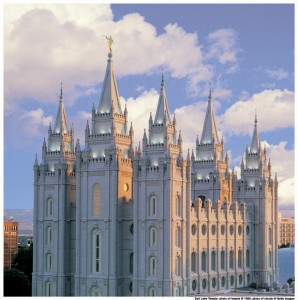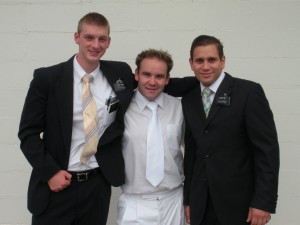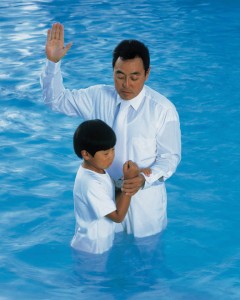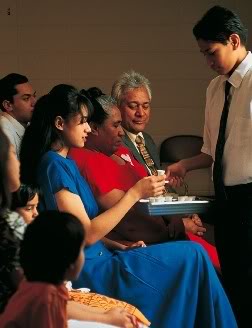The following is my own opinion, but it is what one Mormon believes, so I think it can still be posted on this website.
We recently got a nice comment from a woman who used to be a member of our Church, but has since becoming involved in another, more mainstream Christian Church. She wrote about her “new eyes and strong desire to help others come unto Christ [the same way that she has].” It was really nice to read, actually. And I’m grateful that she commented because it gave me a chance to think about what she is advocating. As a member of a church that proclaims to be the “only true and living church on the face of the earth” (D&C 1:30) it is sometimes hard to wrap my head around the fact that someone could leave this “fully true” church for a “partly true” church. (Don’t get all offended, I’ll explain my labels).
 There are at least two parts to our church: the human part and the inspired part. The human part is honestly just like any other Christian Church. There are fellowship meetings, get-togethers, sermons by people who have some pet virtue they want to beat into the parishioners heads. Sometimes the church is amazing in this realm. Sometimes people reach out to new people and bring them into their warm circle of friends and fellowship. Sometimes seven different people come up to you during the first 14 minutes of church when you are visiting just to introduce themselves (thank you, Abilene Texas 3rd ward! You guys were awesome!). Sometimes there are incredible choral programs for Christmas and Easter. Sometimes someone’s sermon changes your life for good. Sometimes you find your closest friends through the Home or Visiting Teaching programs.
There are at least two parts to our church: the human part and the inspired part. The human part is honestly just like any other Christian Church. There are fellowship meetings, get-togethers, sermons by people who have some pet virtue they want to beat into the parishioners heads. Sometimes the church is amazing in this realm. Sometimes people reach out to new people and bring them into their warm circle of friends and fellowship. Sometimes seven different people come up to you during the first 14 minutes of church when you are visiting just to introduce themselves (thank you, Abilene Texas 3rd ward! You guys were awesome!). Sometimes there are incredible choral programs for Christmas and Easter. Sometimes someone’s sermon changes your life for good. Sometimes you find your closest friends through the Home or Visiting Teaching programs.
And sometimes, honestly, the human parts stink. People are flawed. And they bring those flaws to the church–especially in the LDS Church where everything is run by the members–a lay clergy, volunteers in every single role from the tiniest nursery tots all the way to the High Priests Group nodding off in the back row. So that means that every person’s flaws and weaknesses are somehow incorporated into the functioning Church body (as well as their good qualities, but that observation belongs in the paragraph above). And so, for people like the woman I mentioned above, visiting a warm and welcoming congregation, perhaps with a social following the service and all sorts of ancillary programs to sign up for, may seem like a shocking difference (especially if her LDS ward was the opposite of the Abilene Texas 3rd Ward). And it might seem like that church is more true. More full and lively. And it probably is more full and lively. As far as fellowship and sociality goes, the Mormons don’t claim to have a monopoly. Other churches are simply outstanding at uplifting and professional sermons, providing like-minded friends, urging people to lead honest and moral lives. I don’t think any Mormon would argue otherwise; and if the human part of our church were the only part, then the answer to my post title is Yes. It is just another Christian Church.
But there is another part to the church: the inspired part. And this is the part that separates  it from the “partly true churches” that have great human components. God the Father and Jesus Christ really did restore the Church of Jesus Christ back to the earth through Prophets. The Prophet really does speak to deity. That’s an important distinction. The organization of the church below them with Apostles, Seventies, Elders and so on is truly inspired. It works on a small scale and it works globally. I don’t think that Joseph Smith could have come up with that one on his own. The temples are also inspired. Probably the most important element of the inspired part–that which makes it the true church–is the performance of saving ordinances: Baptism, Gift of the Holy Ghost, the Sacrament, Temple Endowment, Temple Sealing. These things are HUGE. It’s hard to explain to someone who hasn’t been to an LDS temple why they are so important, but it’s like having the map back to heaven, printed in your own language. The temple is the point of having the Church back on the earth at all. This is what makes the LDS Church the “only true and living church on the face of the earth.”
it from the “partly true churches” that have great human components. God the Father and Jesus Christ really did restore the Church of Jesus Christ back to the earth through Prophets. The Prophet really does speak to deity. That’s an important distinction. The organization of the church below them with Apostles, Seventies, Elders and so on is truly inspired. It works on a small scale and it works globally. I don’t think that Joseph Smith could have come up with that one on his own. The temples are also inspired. Probably the most important element of the inspired part–that which makes it the true church–is the performance of saving ordinances: Baptism, Gift of the Holy Ghost, the Sacrament, Temple Endowment, Temple Sealing. These things are HUGE. It’s hard to explain to someone who hasn’t been to an LDS temple why they are so important, but it’s like having the map back to heaven, printed in your own language. The temple is the point of having the Church back on the earth at all. This is what makes the LDS Church the “only true and living church on the face of the earth.”
However, sometimes even members of the LDS Church miss this. They see only the human parts and if they aren’t comparable to the other Christian Churches around their neighborhood then it only makes sense to switch. Being a member of the LDS  church matters if those saving ordinances like baptism and temple ordinances are important to you. They are important to me. They give me security and increase my faith in Christ. I know that He will do what He has promised to do because I’ve covenanted with Him to follow Him and He is always true to His covenants. Those ordinances mean that I have a constant companion all the time: the Holy Ghost. He leads me, comforts me and corrects me. My temple marriage means the world to me because my little family means the world to me: if my road cycling husband were killed in an accident, I have God’s promise that we will be together again in the next life. And I trust that. I won’t even start to imagine losing one of my cherubic children because its too painful to contemplate, but we will be together for eternity too. And when I die, because of what I have learned in the temple and covenanted to do, I have full confidence that I’ll be privileged to meet my Savior. That is so important to me.
church matters if those saving ordinances like baptism and temple ordinances are important to you. They are important to me. They give me security and increase my faith in Christ. I know that He will do what He has promised to do because I’ve covenanted with Him to follow Him and He is always true to His covenants. Those ordinances mean that I have a constant companion all the time: the Holy Ghost. He leads me, comforts me and corrects me. My temple marriage means the world to me because my little family means the world to me: if my road cycling husband were killed in an accident, I have God’s promise that we will be together again in the next life. And I trust that. I won’t even start to imagine losing one of my cherubic children because its too painful to contemplate, but we will be together for eternity too. And when I die, because of what I have learned in the temple and covenanted to do, I have full confidence that I’ll be privileged to meet my Savior. That is so important to me.
Way more important than how successful the ward party was and if today’s sermon wasn’t given as tactfully as I would have liked it. But that is my preference. Everyone is entitled to their own priorities and I won’t condemn you for yours if you don’t condemn me for mine.


